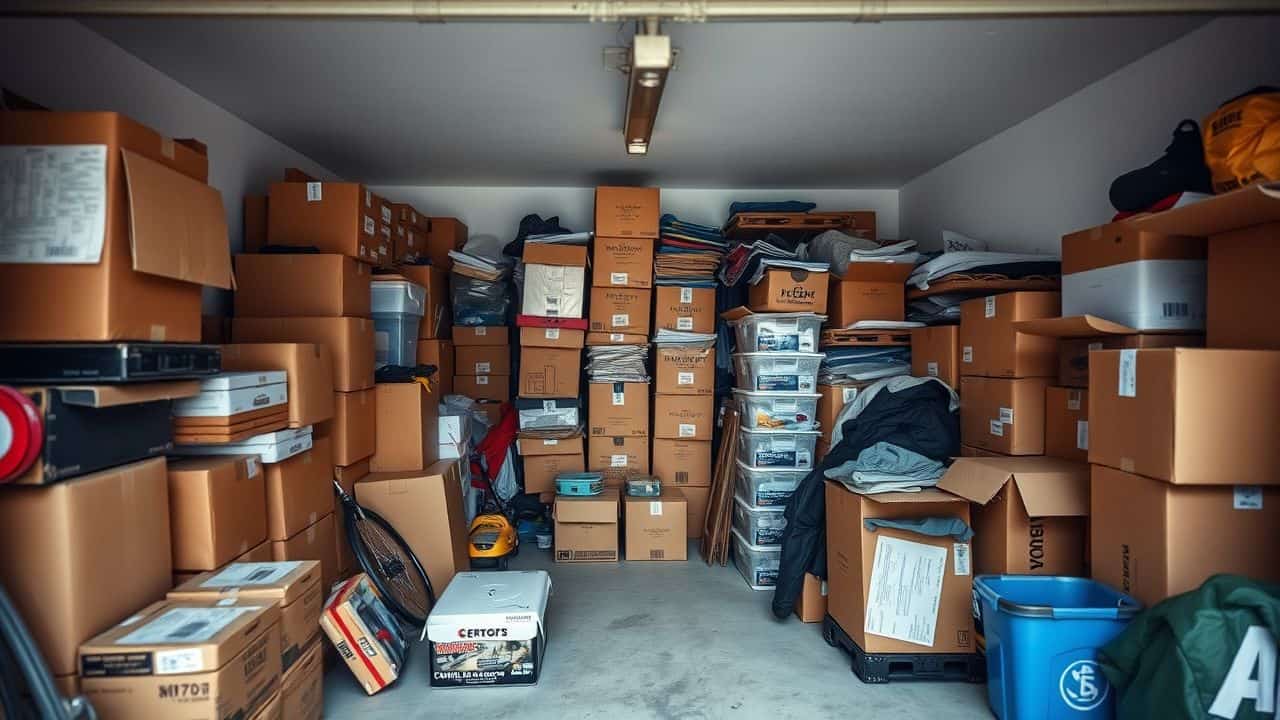Moving or storing items can be a real headache if you don’t know the right storage option. Storage units have grown by 20% in the past five years, showing more people need extra space.
The difference between storage and self storage boils down to who handles your stuff and how much control you want. We’ll break down eight must-know facts about both options to help you pick the perfect storage solution.
Key Takeaways
Storage units have grown 20% in five years, showing a rising need for extra space.
Traditional storage facilities handle everything for you but cost more ($45-$100 for small units) and limit access to business hours.
Self-storage gives 24/7 access and costs less (starting at $29 monthly), but you must move items yourself and travel to industrial areas.
Both options offer climate control, but self-storage puts you in charge of packing and organizing your unit.
Peak rental times run from May through September, when prices often increase for both storage types.
Table of Contents
What is Storage?
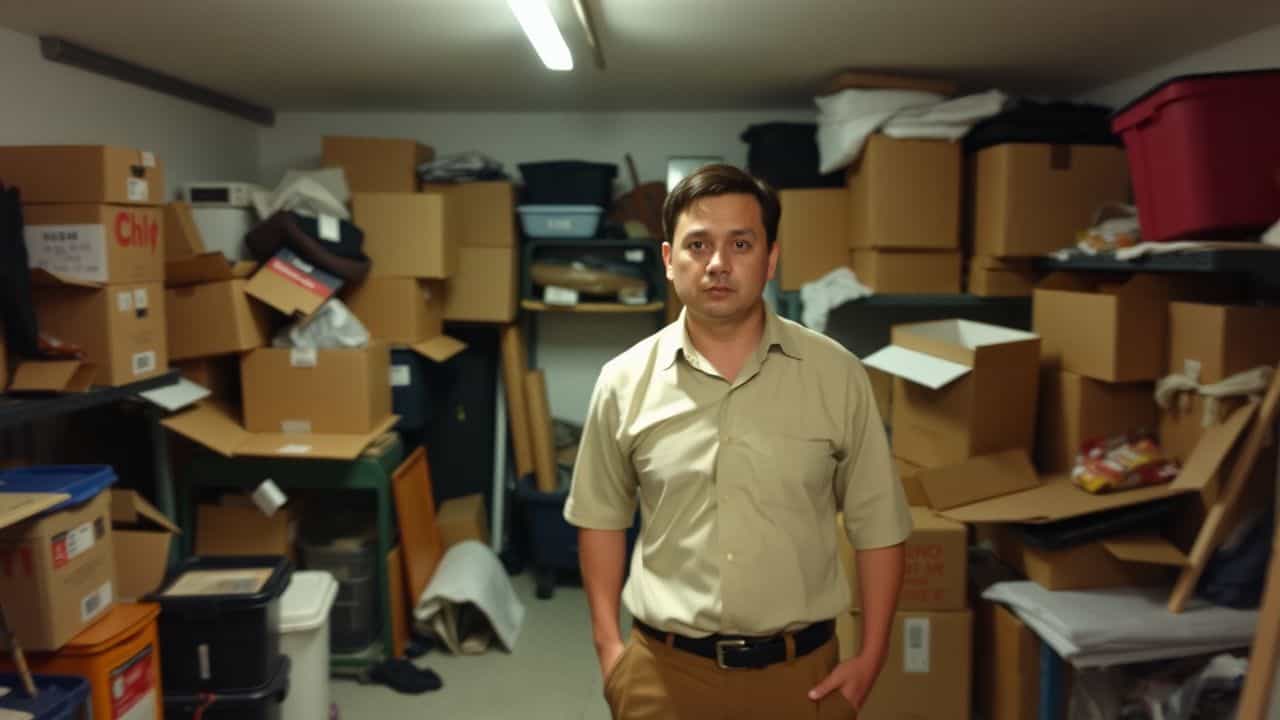
Storage gives you a place to keep your stuff safe while someone else watches over it. Think of it as dropping off your car at a valet service – you hand over your items, and trained staff handle the rest, from moving to stacking your boxes in climate-controlled spaces.
Definition and Purpose

Public storage facilities offer a safe place to keep your stuff away from home. Think of it as renting a spare room or garage where you can put extra furniture, boxes, or business items.
These climate-controlled warehouses protect your belongings from damage, theft, and bad weather. Most facilities offer indoor storage units with top-notch security systems to guard your valuables.
Full-service storage goes beyond just giving you space. These facilities help with packing, moving, and organizing your items through inventory management systems. They handle everything from lifting heavy boxes to tracking what goes where in their warehouse storage.
A storage unit is like having an extra closet that never runs out of space.
Many businesses use these spaces to store files and follow data protection rules. The staff takes care of transport, so you don’t have to lift a finger.
Common Uses

Storage serves countless daily needs in modern life. People store furniture during moves, appliances while remodeling, and electronics between seasons. Business owners keep their extra inventory and equipment safe in storage spaces.
Many folks use storage units to protect valuable items like antiques and artwork in climate-controlled settings. Drive-up storage makes it easy to load and unload heavy items straight from trucks or vans.
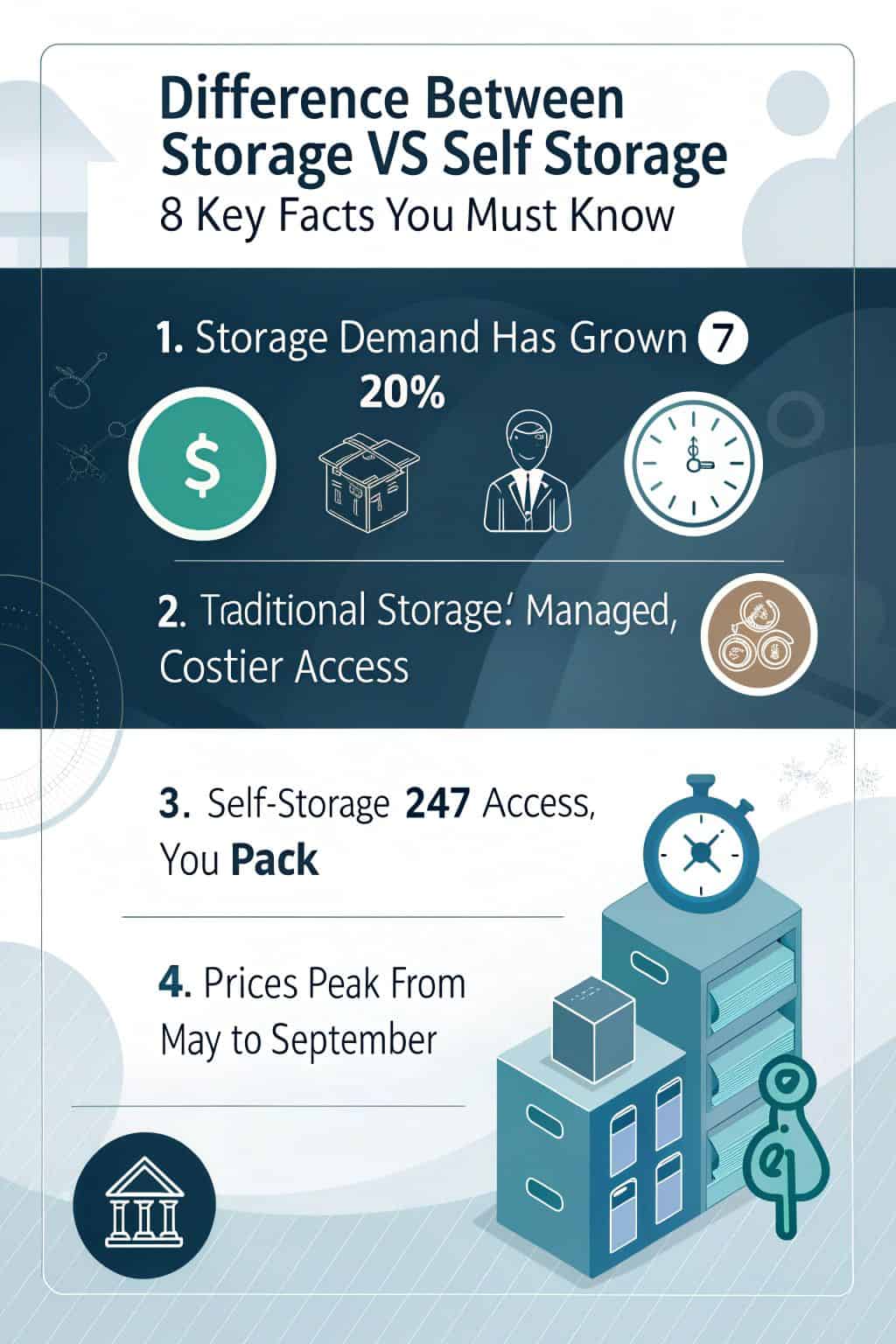
College students rely heavily on storage units during summer breaks. They pack up their dorm items and keep them secure until the next semester starts. The storage facility gives them a perfect spot to store mini-fridges, textbooks, and winter clothes.
Climate controlled units protect sensitive items from heat and humidity damage. Seasonal storage helps keep homes clutter-free by rotating holiday decorations, sports gear, and outdoor furniture throughout the year.
What is Self Storage?

Self storage gives you a personal space to keep your stuff safe and sound. You’ll get a private unit with your own lock and key, plus you can drop by anytime to grab what you need – just like having an extra garage away from home.
Self Storage Definition and Purpose

A storage unit works like an extra room away from home. People rent these spaces to keep their stuff safe and accessible whenever they need it. Many folks use these units as a smart way to store seasonal items, such as winter clothes or summer gear.
You can trust NSA Storage for top-tier self-storage services to handle all your storage needs.
Storage units offer flexible solutions for both personal and business needs. These spaces come in different sizes with features like climate control and humidity control. Business owners save money by storing inventory here instead of renting expensive retail space.
Moving families find these units perfect for keeping furniture safe during house transitions. I’ve personally used storage units during my recent move, and the convenience of 24/7 access made the whole process much easier.
Popular Self Storage Uses
Self storage units serve as a lifeline for college students during summer breaks. Many students pack their dorm items into climate-controlled storage spaces while they head home or study abroad.
These units keep textbooks, furniture, and personal items safe until the next semester starts. Business owners also rely on self storage to manage their inventory and equipment needs.
Self storage isn’t just a space, it’s your personal warehouse without the hassle.
RV owners, boat enthusiasts, and vehicle collectors turn to self storage for their parking needs. The outdoor storage areas offer perfect spots for motorhomes, campers, and trailers during off-seasons.
Moving families often rent month-to-month storage units to keep their belongings safe during home transitions. Many retailers use these spaces to store excess inventory, while homeowners stash seasonal items like holiday decorations and outdoor furniture.
Key Differences Between Storage and Self Storage

Storage and self-storage might sound similar, but they work in totally different ways. Each option offers its own mix of access rules, pricing, and extra perks – from basic warehouse space to fancy wine storage units with climate control.
Accessibility and Control

Self storage units give you total control over your stuff. You can grab your boat, RV, or business items any time of day or night. Most facilities offer 24/7 access through secure gates with your personal code.
I learned this firsthand when I needed to pack a storage unit for my moving needs last summer.
Traditional storage places often limit your access to business hours. You might need to call ahead or make an appointment to get your things. This can be a real pain if you need your minivan or wine collection on short notice.
The best part about self storage is that you hold the only key to your unit. No one else can enter without your say-so, giving you complete privacy and peace of mind.
Cost and Pricing Models
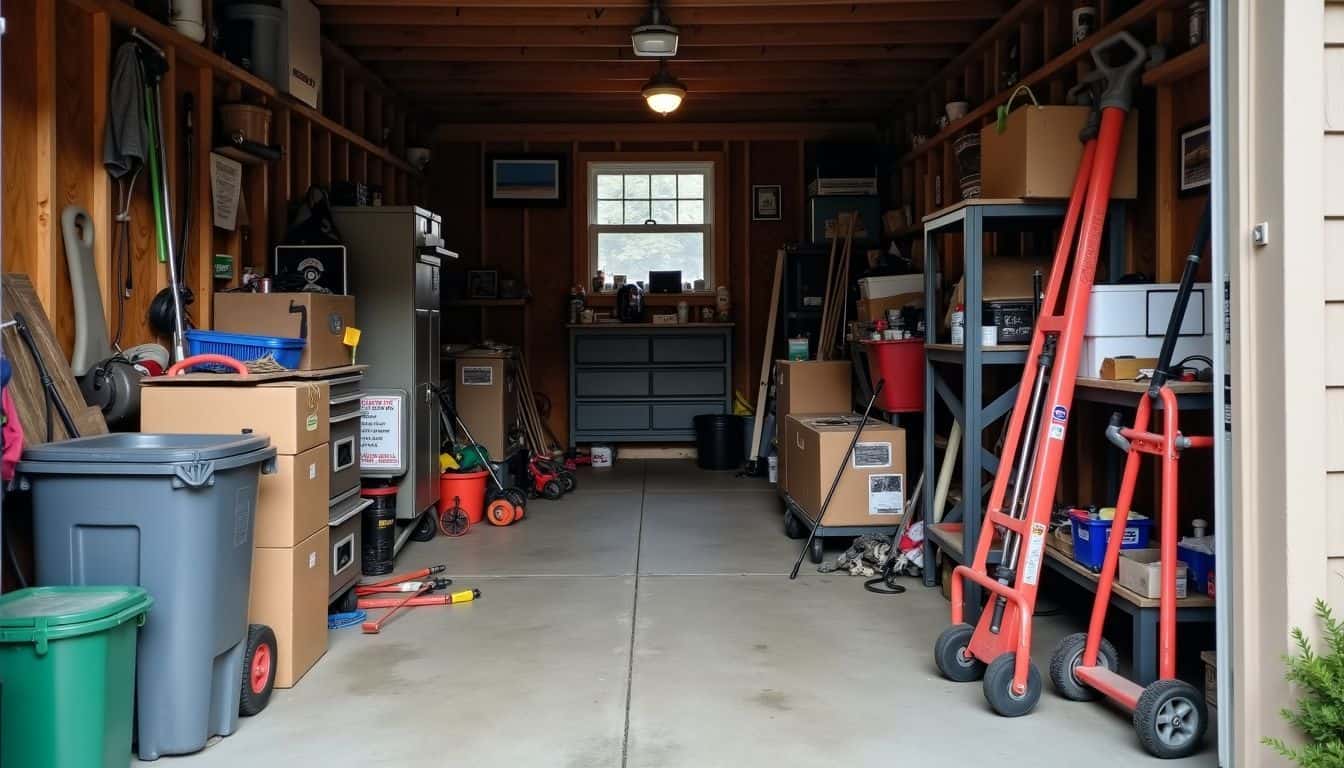
Storage costs vary based on what you need to store and where you live. Traditional storage facilities charge higher rates, with 5 x 5 units costing between $45 to $100 in busy cities.
Monthly fees for vehicle storage lockers hit around $130 for a compact car. Moving storage and boat storage often need bigger units, pushing prices even higher.
Smart storage shoppers save up to 50% by exploring alternative options.
Peer-to-peer platforms offer better deals on storage rentals. Month-to-month storage rental prices drop to $29 for basic units in some areas. Vehicle storage costs plummet to $44 for a compact car through these services.
Public storage facility fees include extra charges for packing services and insurance. Many places ask for upfront payments or long-term leases, while others stick to simple monthly billing.
Management and Services Provided

Traditional storage facilities offer basic warehousing with pallet racking and freight handling. Staff members manage inventories and handle logistics during set business hours. The mobile shelving systems help workers move items quickly through the facility.
Self storage puts you in charge of your unit with 24/7 access through digital keypads. Many facilities provide portable storage options with mezzanine levels for extra space. Modern vault systems and surveillance cameras keep your items safe.
Full-service companies go the extra mile by picking up your stuff and tracking it digitally. Let’s explore the advantages and drawbacks of each storage type.
Pros and Cons of Storage
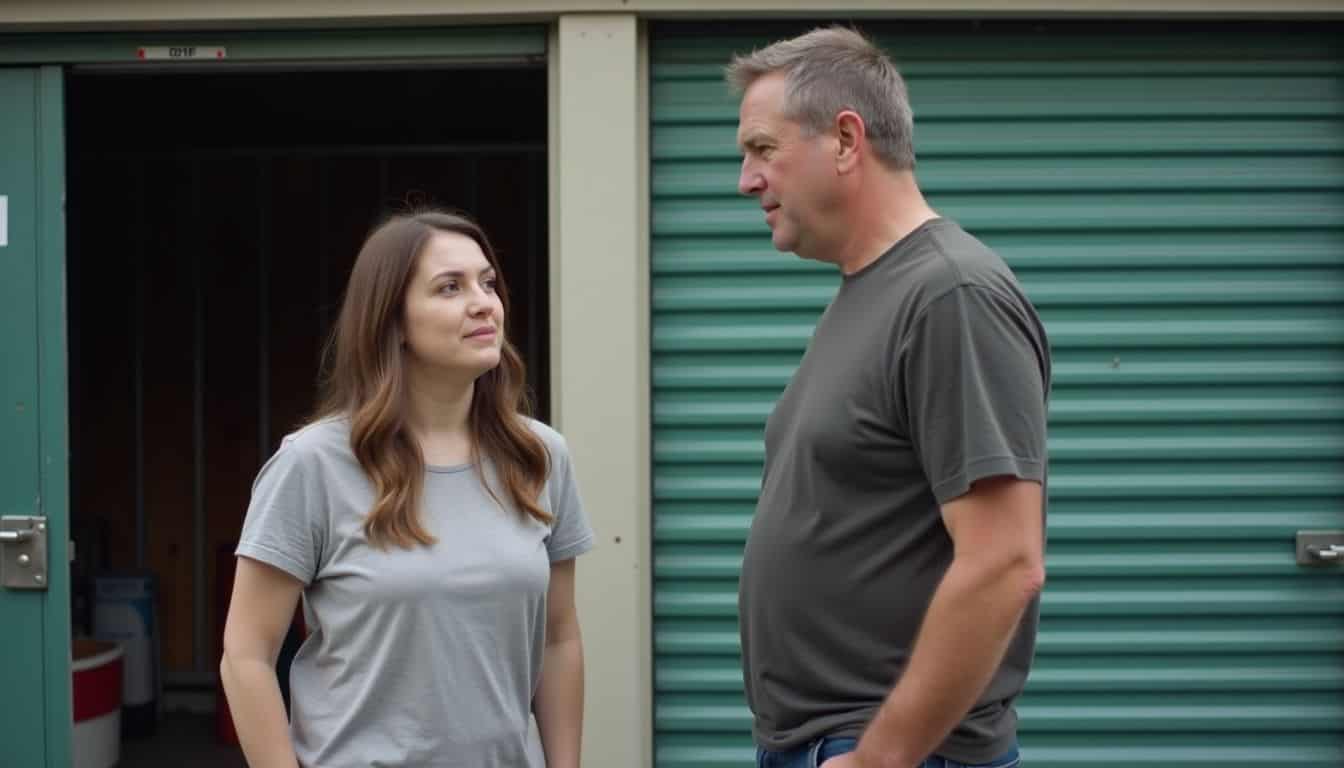
Traditional storage brings both sweet rewards and tough challenges to the table. You’ll need to weigh these ups and downs before you pick a storage option for your stuff, whether it’s your RV during winter or those boxes from your basement remodel.
Storage Advantages
Storage offers great perks that make life easier. Full-service storage companies bring free bins and boxes right to your door, saving you trips to the store. Your items stay super-safe in climate-controlled basements with top-notch security systems.
No more worrying about your stuff getting damaged or stolen.
The best part? You can track everything online with photos of your inventoried items. Perfect for business storage needs or keeping track of college storage during summer break. The staff handles all the heavy lifting, packing, and organizing.
They’ll even help you find specific items when you need them. Your belongings stay protected behind secure walls where only trained staff can access them.
Storage Disadvantages
Traditional storage comes with hefty price tags that can strain your wallet. My buddy paid $200 more per month compared to his old self-storage unit. You’ll face extra charges for pickup, delivery, and mandatory insurance coverage.
The wait times for getting your stuff can drive you crazy – I once waited six days just to grab my RV supplies during a remodeling project.
Access to your items feels like trying to get into Fort Knox. The company photographs and lists every item, which sounds great until you need something right away. Most places make you schedule visits days ahead.
Plus, you can’t just pop in to grab that one tool you need for a quick fix. These rules make sense for security, but they can really mess up your plans.
Pros and Cons of Self Storage

Self storage gives you total control over your stuff while saving money on monthly rent. You’ll need to handle everything yourself though, from moving boxes to keeping things clean.
Self Storage Advantages
Modern self-storage units pack a punch with amazing perks. You’ll love the freedom to pop in and grab your stuff anytime, day or night. I’ve used these units during my RV storage needs, and the 24/7 access was a game-changer.
The security features will give you peace of mind too. Most facilities use top-notch cameras and special access systems to keep your belongings safe.
Storage units come in all shapes and sizes, perfect for any project. Whether you need space for remodeling storage or just extra room, you’ll find the right fit. The flexible lease terms won’t break your bank, either.
I found it super helpful to organize a storage unit based on what I needed most often. The best part? You can rent for as long or short as you want.
No long-term contracts to worry about here. These units offer way more bang for your buck compared to old-school storage options.
Self Storage Disadvantages
While self storage offers freedom, it comes with its share of drawbacks. Most self storage units sit in industrial areas far from city centers. This distance means extra time and gas money for each visit to your unit.
The monthly costs can spike during peak seasons, especially from May through September.
You’ll need to pay extra for insurance and special locks to protect your stuff. Climate control costs more, too, but you’ll need it to keep your items safe from heat and moisture. The quality of different storage places varies a lot.
Some units might have security issues or pest problems. I once rented a unit that looked great at first, but later found signs of mice getting in through tiny gaps near the door frame.
People Also Ask
What’s the main difference between storage and self-storage?
Storage means keeping items in a facility where staff handles your stuff, while self-storage gives you a private unit that you can access on your own terms. Think of storage like valet parking, and self-storage like having your own garage!
Can I visit my items whenever I want in both types?
With self-storage, you get a key or code to visit your unit 24/7 in most cases. Regular storage has set hours and might need appointments. It’s like having a library card versus asking a librarian to fetch your books.
Which option costs more?
Regular storage typically costs more because it includes handling and staff service. Self-storage is cheaper since you do the heavy lifting. But remember, cheaper isn’t always better – it depends on what you need.
How do I pick between storage and self-storage?
Choose storage if you want hands-off service and don’t need frequent access. Pick self-storage if you want control over your stuff and plan to visit often. It’s like choosing between a full-service hotel or a vacation rental – each has its perks!
References
https://www.extraspace.com/self-storage/
https://www.myplace.at/en/what-is-self-storage
https://www.safestore.co.uk/the-difference-between-self-storage-and-container-storage/
https://en.wikipedia.org/wiki/Self_storage
https://scobeymoving.com/pros-and-cons-of-self-storage-vs-professional-storage/ (2023-08-30)
https://www.pods.com/blog/storage-container-storage-unit-costs (2024-02-20)
https://www.kwiklockstorage.com/blog/the-differences-between-self-storage-and-public-storage (2023-06-27)
https://www.storagemart.com.ph/blog/self-storage-vs-garage-storage-the-pros-and-cons/ (2023-05-25)
